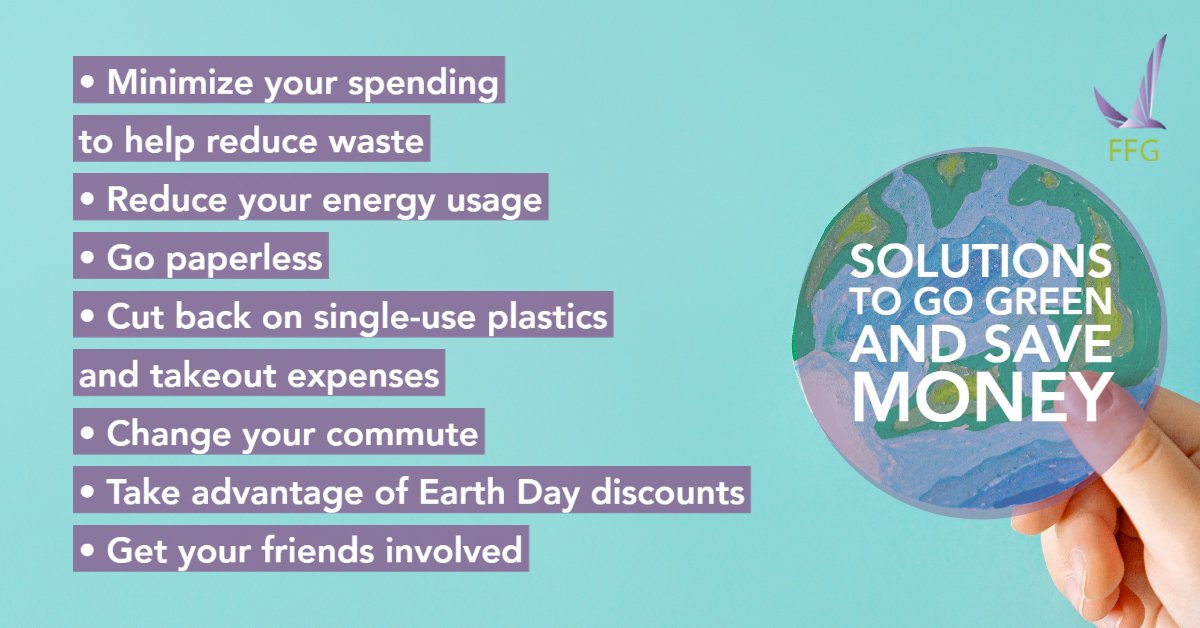Earth Day 2026: 7 Solutions to Go Green and Save Money

Updated: January 6, 2026
Earth Day 2026 is on April 22. It comes around only once a year, but reducing, reusing, and recycling all year doesn’t just help the environment — it can also be a great way to save money.
So this year, try not to spend only a day on acts that are good for our planet. Instead, look to take action in more sustainable ways that may also help you save on spending in the long term.
Table of Contents
Invest in Our Planet
Earthday.org is an organization striving to spread awareness of global environmental issues through diversification, education, and mobilization.
They have marked “Invest in Our Planet” as the theme for Earth Day 2023, reinforcing the idea of global solidarity in protecting our planet and urging all individuals to participate.
The latest economic revolution is different from its predecessors in that there are two additional objectives to consider:
- combating the climate emergency
- creating eco-friendly economies worldwide.
To succeed, we need to invest collaboratively in a sustainable future.
Earth Day 2026 Quiz
Are you curious to know how much you know about our planet?
Earthday.org has created a set of quizzes to test your knowledge of our planet. Challenge yourself and see what you can learn about this fantastic place we call home.
Taking the Invest In Our Planet Quiz is the perfect way to begin your journey. It’s an informative and exciting quiz that provides a great starting point.
Go Green & Save Money with Our Seven Eco-friendly Solutions
Here are things you can start working on today to reduce your carbon footprint without forfeiting your wallet.
#1 Minimize Your Spending to Help Reduce Waste
Cutting back on unnecessary purchases will help you put more money into savings and reduce waste from store packaging. According to a recent Environmental Protection Agency (EPA) report, the containers and packaging category had the most plastic tonnage at over 14.5 million tons in 2018.
To minimize unnecessary spending and consequently reduce waste, you need to do the following essential things:
- Budgeting is the number one thing that helps to control spending and avoid unnecessary purchases.
- Understand behavioural psychology to recognize marketing traps that make us buy what we don’t need and stay disciplined. Such things as lifestyle creep and instant gratification can cause grave danger to your financial health. Thus, understand how they work and avoid them.
#2 Reduce Your Energy Usage
One simplest and most effective ways to save money and go green is to turn off the lights.
In addition, you can also:
- Switch your utility providers. Comparison shopping which provides your utilities, can generate some savings. When choosing a provider, you can also opt for a company that uses renewable sources for its energy production. In some states, renewable providers may be the same price or even cheaper than traditional ones. In any case, it is worth examining available utility providers and comparing the rates.
- Make sure your home is well insulated. Insulation plays a critical role in how much you spend on energy. Carefully inspect and evaluate your insulation. In winter, a well-insulated house will retain heat better; in summer, it can reduce how often air conditioning needs to run.
- Look for the energy “vampires.” Your electronic devices could use energy even if you’re not using them. People can buy home energy monitors to determine whether an electronic device uses energy even when powered off. The more straightforward method is to feel the device. If it’s warm, it’s using power. Consider unplugging devices when possible or investing in smart plugs that can be automated to turn a device on only when it’s typically used.
- Be smarter in the kitchen:
- Use your dishwasher rather than clean dishes by hand.
- Reheating food in the microwave uses less energy than ovens do. Similarly, use smaller appliances when possible. They are more energy-efficient.
- When baking, open windows to let hot air out of the kitchen.
- Match pots and pans to the right-size burners.
- Defrost in the refrigerator rather than the microwave.
- Remember that older appliances are less energy efficient.
- Replace your incandescent lightbulbs. According to the Department of Energy, LED lights use at least 75% less energy and last 25 times longer. When replacing the bulbs throughout your house, prioritize the lights in rooms that you spend the most time in.
#3 Go Paperless
If your mailbox is constantly filled with paper bank and credit card statements that go directly into the shredder, take a few minutes to request online reports instead.
Switch to online statements that can be saved to your digital device or are accessible through your online account for a simpler and more cost-effective solution. You may already incur a small monthly fee — which some banks charge for paper statements — that can be eliminated by going paperless. Check your balances and online accounts regularly to avoid falling behind after making the switch.
#4 Cut Back on Single-Use Plastics and Takeout Expenses
Instead of picking up a coffee or soda on your way to work or ordering takeout multiple times each week — racking up plastic containers and utensils — bring your beverages in a reusable water bottle or coffee mug and prepare more meals at home.
Consumer expenditure data by the Bureau of Labor Statistics show that the average American household spends $3,459 annually on food away from home. Reducing the amount of takeout, delivery and other food purchases with large amounts of single-use plastic can help you reduce your budget and carbon footprint.
#5 Change Your Commute
Not everyone lives in a walkable or bike-friendly city, but if you live within a reasonable distance of your workplace, dedicating a bit more time each day to a pedestrian commute is a great way to go green and save.
If walking or biking isn’t viable, try carpooling or taking public transportation more often to reduce fuel emissions. Even a few days of choosing an alternative type of commute each month could save you money over time.
#6 Take Advantage of Earth Day Discounts
If you’re looking for ways to shop more sustainably while saving money, look for Earth Day discounts from environmentally conscious brands and retailers that you can buy without hurting the environment or your wallet.
#7 Get Your Friends Involved
Like anything that takes commitment, going green is difficult without support. To keep you accountable, get your friends and family to embrace sustainability too.
In celebration of Earth Day 2024, participate in a free local activity or volunteer opportunity in your city, like bagging trash in public areas or tending a community garden. Check local events on EarthDay.org, Facebook, community boards, and online newsletters for opportunities or join a community cleanup coordinated by Earth Day Network.
Conclusion
There’s no need to wait for Earth Day 2024 to start acting. Follow these tips right now and start saving your money and your planet.






Good bunch of advice, it is always important to start from yourself. It was helpful for me to pause before making a purchase and asking why I am buying it. It really works. If it is a need, go for it. If it is a want, at least sleep on it for one night to see how you feel tomorrow. It will be beneficial both for the planet and your budget)